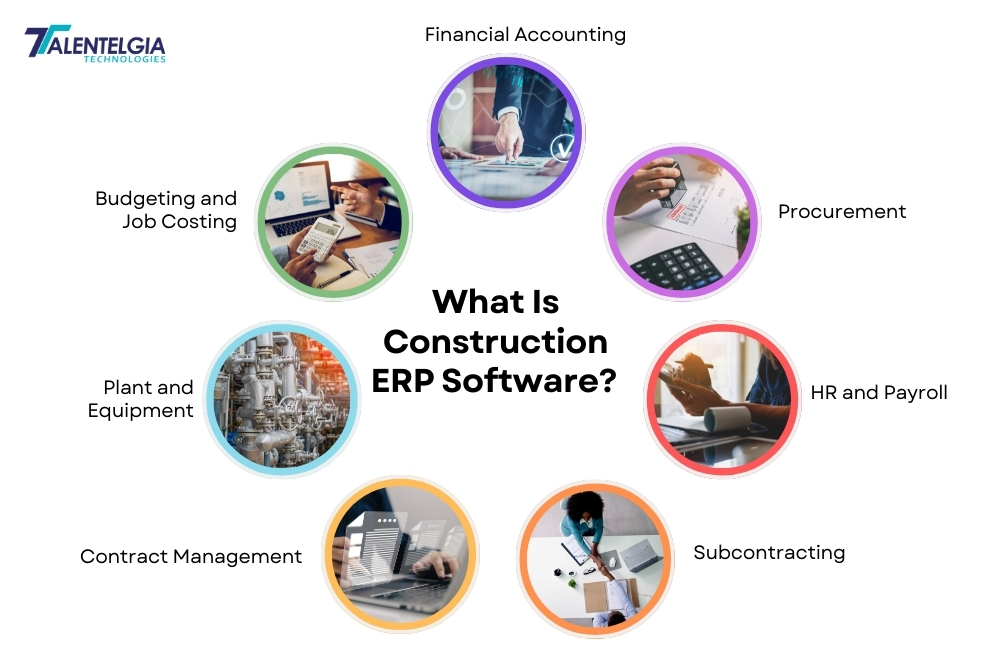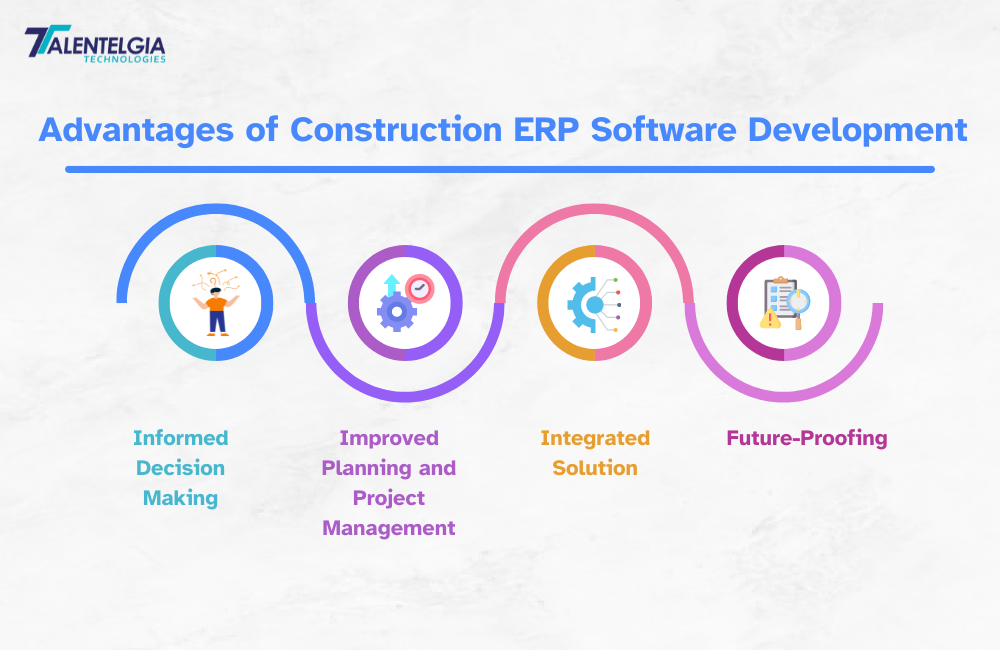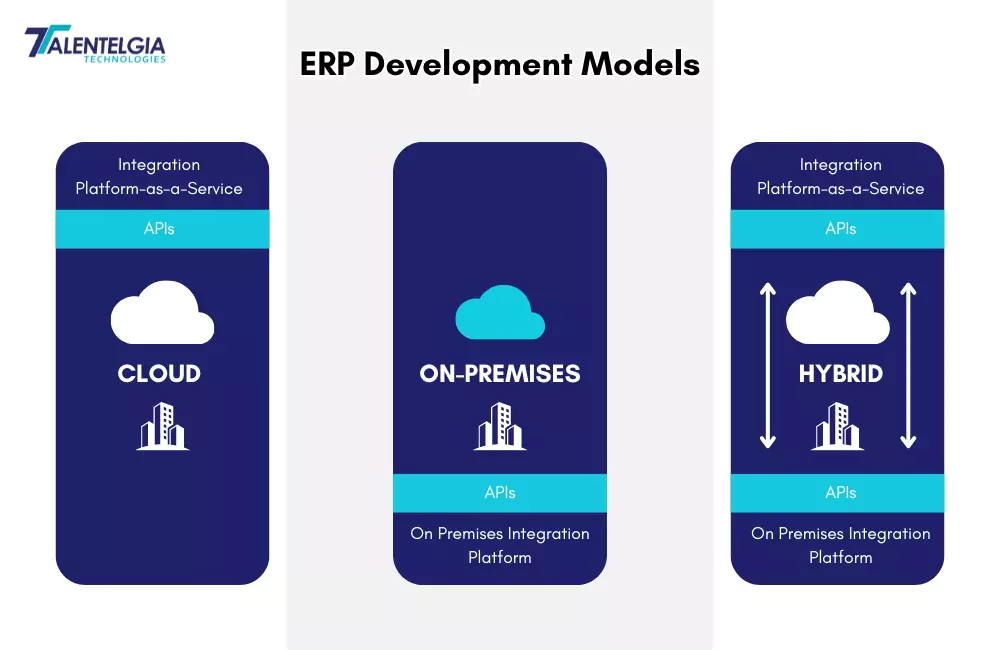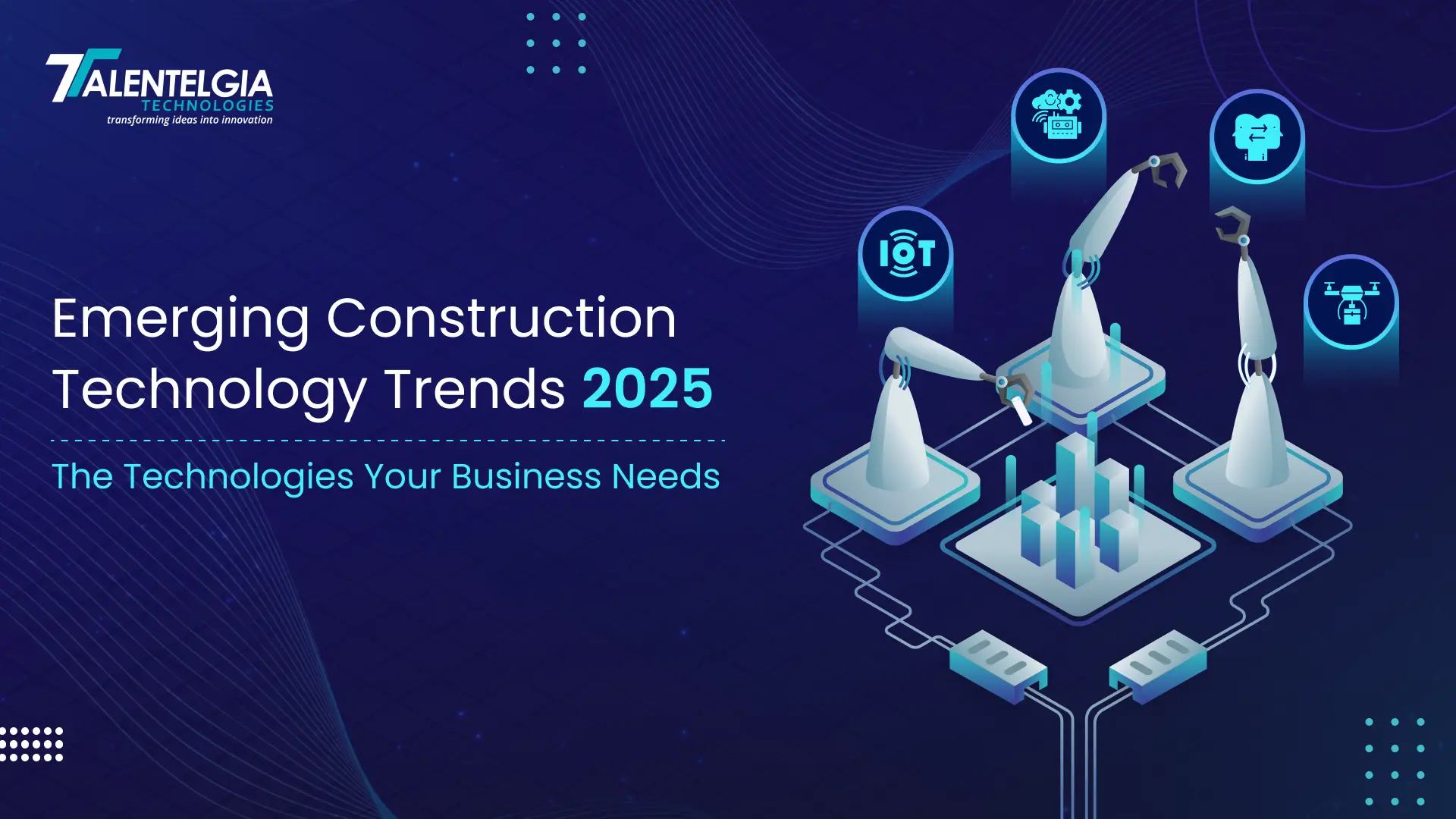Effective planning and integration of projects have become important to keep up with the needs of the construction industry. Due to the pressure of deadlines and fewer resources, construction professionals are looking for solutions that will lead to improved performance and profitability.
That is why entrepreneurs looking for business solutions for the growth of their construction venture go for Enterprise Resource Planning software. It helps them manage work processes like accounting, procurement, project management, risk management, and compliance.
ERP development services integrate various functions into one complete system to streamline processes and improve efficiency across the entire organization. So, to help you make the right choice, we present a comprehensive guide with details about construction ERP software development

What Is Construction ERP Software?
Construction ERP software is designed specifically for the specific needs of construction companies. It is the tool of choice for managing contractors, employees, raw materials, equipment, and expenses across projects and offices.
But construction projects also have their share of challenges, especially when spread across multiple locations. This is where construction-specific ERP software comes into play, taking key elements from the ERP model and adapting them to fit the construction industry’s project-focused approach.
Construction ERP software has become a valuable tool in construction, streamlining the process with its solutions. It Increases productivity and brings new levels of efficiency to your construction project.
Challenges in Construction ERP Software Development
ERP solutions solve important problems in construction businesses. From planning and account management to communication, forecasting, and decision-making, ERP simplifies operations and keeps projects on time and within budget. It simplifies construction management and makes operational efficiency, customer satisfaction, and success easy in a changing environment.
Inadequate Planning
One of the main reasons behind losses in the construction industry is poor management and customer dissatisfaction.
Without enterprise resource planning (ERP) software, these challenges continue to exist and create problems for the success of the project. However, ERP software solves these problems by allocating resources correctly, managing time efficiently, and finding funds. By using ERP systems, construction companies can improve their planning processes, thereby reducing risk and improving the overall results of the project.
Manage Multiple Customers
Infrastructure often involves multiple customers and an ERP system can make it challenging to keep up with change, information, security risk, and compliance. However, ERP software simplifies customer management by providing secure information that facilitates effective communication and enables effective management.
With ERP, construction companies can manage relationships with multiple clients, increasing trust, reducing risk, and encouraging better collaboration throughout the life of the project.
Inadequate Communication
The absence of an ERP system often leads to a lack of communication in a construction project, leading to sloppy work and delays in the completion of the project. But ERP bridges these communications by providing real-time updates and encouraging greater collaboration between stakeholders.
By implementing ERP, the development team can ensure that all stakeholders have access to the most up-to-date information, reduce the potential for misunderstanding, and ensure everything runs smoothly.
Actual Expectations and Estimates
Inaccurate estimates and cost estimates are common problems in construction due to human error and trust in old records. However, ERP systems play an important role in solving these problems by helping analyze customer requests, set success goals, and provide accurate cost estimates.
By using ERP software, construction companies can improve their ability to make informed decisions and be realistic and predictable throughout the project.
Ineffective Decision Making
Lack of information in real-time ERP often leads to poor performance and wrong decisions during the design process. However, ERP solutions offer real-time data analysis capabilities, allowing stakeholders to make decisions based on accurate data.
ERP systems enable companies to optimize their processes, reduce errors, and complete work by improving operations and providing insight into the quality of the project.
Advantages of ERP Construction Software Development

ERP Development Models
Developing ERP software is not only easy but also a necessity for your business. They provide integrated solutions and increase efficiency. Management and profitability Some of the key benefits of business after adopting construction ERP software development are:
Informed Decision-Making
ERP serves as a primary tool for crucial financial decisions, offering powerful insights into project costs and margins. Data-driven decision-making becomes efficient with easy access to dashboards, enabling the identification of risks and opportunities.
Improved Planning and Project Management
ERP helps track, store, and analyze procurement, labor, and equipment data for efficient project progress. This prevents costly mistakes, such as paying for unused equipment, leading to significant savings over time.
Integrated Solution
ERP for construction provides a single platform for managing various applications, processes, and resources in real-time. Automation reduces administrative burdens, allowing more time for building customer relationships, maximizing sales, and optimizing resources.
Future-Proofing
If you want to ensure the profitability of your venture follow the right strategies and offer end-to-end integration tailored specifically for construction with features like digital document flows, custom dashboards, and the latest technologies.

Key Features and Functionalities of Construction ERP Software
As construction firms start their search for an ideal ERP solution, these features serve as a roadmap for selecting a system that aligns with the unique needs of the industry. From project visualization with CAD interfaces to intricate workforce management, a robust ERP system can be the catalyst for enhanced efficiency and success in construction projects..
However, when searching for the best enterprise resource planning (ERP) solution, construction companies must check several factors to determine the system that meets the specific requirements of the job.
These features are based on principles that lead to the selection of an ERP system that can meet the various needs of the construction industry.
Let us look briefly at the key features that define ERP solutions for the construction industry and demonstrate their importance and impact on project management, financial allocation, and overall performance. These factors play an important role both in web app development and mobile apps.
Let’s look at its essential features:
- CAD Interface: Project visualization through seamless CAD integration.
- Accounting: Robust financial tracking for project overview.
- Service Fleet Asset Management: Optimize service fleet and asset deployment.
- Financial Management: Comprehensive tools for budget and expense tracking.
- Payroll: Streamlined processes for accurate workforce compensation.
- Management of Contractors: Dedicated modules for effective contractor collaboration.
- Sub-contractor Management: Seamless integration of sub-contractors into workflows.
- Logistics and Transport: Efficient handling of processes with logistics app development.
- Scheduling: Robust tools for timeline management and resource allocation.
- Complex Workforce Management: Advanced features for intricate workforce handling.
- Inventory: Comprehensive management to track and optimize material availability.
- Workflow Processes: Streamlined workflows with customizable features for adaptability.
Technologies Used in Construction ERP Software Development
Technology selection plays an important role in deciding and working on ERP products. From programming languages to database management, all aspects contribute to system performance, scalability, and availability.
Let us take a look at some of the best technologies for building ERP products and explore their benefits, applications, and options. By understanding each technology stack, ERP software development companies can make informed decisions and create powerful, scalable, and customer-friendly solutions.
Front-end. The technology on the front end determines the user interface of your ERP system. For example – HTML creates the content of a web page, while CSS defines how the web page is presented, including layout, colors, and fonts. JavaScript supports efficient functionality and user interaction. React.js, Angular, Vue.js etc. Popular front-end frameworks such as. Reusable user interface elements balance design and simplicity with ease of use. Popular front-end frameworks to consider:
- React.js
- Angular
- Vue.js
Back-End (Server-Side)
It ensures the operation of a powerful ERP system in the backend and the main technology plays a role. Backend languages such as Java, Python, C#, PHP meet many needs. Node.js and Ruby on Rails are good examples of web frameworks that make server-side application development easier. This is the engine that powers the ERP system’s functionality.
| Key | Backend-Technologies |
| Programming Languages | Java, Python, PHP |
| Web Frameworks | Node.js, Ruby on Rails, ASP.NET |
Database
Stores and manages all the ERP system’s data. Popular options include SQL Databases that use Structured Query Language (SQL) based databases like MySQL, PostgreSQL, or Microsoft SQL Server and NoSQL Databases. These are more flexible databases for handling unstructured data, like MongoDB or Cassandra.
Cloud Development
Databases – They are essential components of construction ERPs essential for storing and managing ERP data, including SQL databases such as MySQL and NoSQL databases such as MongoDB. Many ERPs are now cloud-based for scalability and accessibility.
Cloud platforms to consider
- Amazon Web Services (AWS)
- Microsoft Azure
- Google Cloud Platform (GCP)
Here are some additional points to consider
The technology you choose depends on factors like the size and complexity of the ERP system. The target platform (web, desktop) and team you choose. Additionally, the importance of security, scalability, and integration ensures that ERP systems are robust, flexible, and interoperable in the wider business environment.
Security: Make sure the technology you choose prioritizes security measures for handling sensitive business data.
Scalability: The system must be able to expand and adapt to your growing business needs.
Integration: Make sure your ERP can be integrated with other existing business applications.
Summary Picking the right tech is key to building an ERP system. It starts with the front end, where we make what users see using HTML, CSS, and JavaScript, plus stuff like React.js or Angular to help. Then, on the back end, we build the system's engine using languages like Java or Python, and tools like Node.js or Ruby on Rails. Storing and managing data is crucial, and we do that with SQL databases like MySQL or NoSQL ones like MongoDB. More and more, people are using cloud platforms like AWS or Azure for flexibility. We need to think about security, scalability, and how well everything works together to make sure the ERP fits into the big picture of the business.
Case Studies: Successful Implementations of Construction ERP Software
Choosing the right construction ERP software is a big deal for companies in the construction world. As the industry changes, managing projects, resources, and communication becomes super important for success. Construction ERP software is like a comprehensive tool, custom-made to tackle the tough challenges construction workers face every day.
In this section, we’re going to look at examples of how construction ERP software has made a big difference. These show how using ERP software has helped construction projects in big ways, from improving teamwork to getting projects done on time. We’ll explore these to learn how ERP software can help construction businesses reach their goals and succeed in today’s fast-paced world.
Skanska USA
Skanska, a leading international engineering and construction company, used ERP systems to improve the massive $1.2 billion overhaul of New York’s LaGuardia airport. ERP facilitates instant information sharing among all stakeholders, improving communication and keeping subcontractors on the same page, resulting in the success and completion of projects on time
Turner Construction Company
Another prominent construction firm, Turner Construction used a construction ERP system for the construction of the West Headquarters of Salesforce in San Francisco.
The ERP’s integrated document management features ensured efficient plan revisions and change order tracking, while its mobile capabilities allowed for real-time field data collection and progress updates.
This transparency and streamlined communication minimized delays and ensured project success. ERP data management capabilities enable revision and change tracking, while mobile capabilities enable instant data collection and updates. This regular communication reduces delays and ensures the success of the project
Balfour Beatty
Global construction team using the ERP system for the London Power Tunnel project. A powerful ERP project management tool simplifies resource allocation and planning, which is especially important for land-based construction. Additionally, ERP software can provide valuable information to support risk management and mitigation strategies
Drexel Group
This national real estate developer faced the challenge of managing separate activities and maintaining relationships across various developments. They implemented an ERP system with features such as scheduling, quality control, and team access. Result? Rework costs were reduced by 20% thanks to improvements in quality control processes and communication. Additionally, ERP planning can improve field performance and thus reduce project completion time.
McCarthy Holdings
This major construction company solves distributed workforce and complex transportation management problems on multi-state highway construction projects. Their solution is a cloud-based ERP system with features such as employee management, file-sharing tools, and instant financing. The cloud-based system facilitates seamless communication and data access for teams in different locations. ERP resource budgeting and cost-tracking capabilities provide information that allows McCarthy Holdings to optimize resource allocation and stay on target.
Quick facts
- Construction companies can expect an ROI of 15-20% within three years of implementing construction ERP software.
- ERP software can help reduce project costs by up to 10% through improved efficiency in areas like material management, labor allocation, and waste reduction.
- construction projects using ERP software experience a 10-20% improvement in on-time completion rates
Future Trends in Construction ERP Software Development
The construction industry is undergoing a massive shift and enterprise resource planning (ERP) plays an important role in this transformation. They directly impact performance improvement and play a greater role in project management. The advanced ERP solutions meet the unique needs of the construction industry. Let us look at the future trends in construction ERPs that will affect this industry.
Cloud-based ERP solutions
Cloud-based ERP solutions enable business development. They simplify business management with the necessary tools that are scalable, practical, and cost-effective. These solutions use cloud technology to help construction companies securely store large amounts of project information while encouraging team collaboration. Cloud-based ERP solutions improve management processes and increase business performance by providing access to critical information from anywhere via an internet connection. By centralizing project information and operations in the cloud, construction companies can improve distribution, improve communication, and complete the project.
Mobile ERP Applications
Mobile ERP applications augmented by an iOS or Android app development company are boosting the growth of onsite installation sites by allowing employees to access new information and work from their smartphones and tablets. These applications allow field workers to track progress, manage inventory, and communicate with partners even in remote areas without internet connectivity. The offline capabilities and GPS tracking feature of ERPs reduce delays, increase productivity, and facilitate collaboration between stakeholders. Through collaboration, construction companies can adapt to existing construction and improve the performance of the project.
Integration of IoT and Data Analytics
Combining the Internet of Things (IoT) and data analytics transformed the role of project management in construction. IoT devices, such as sensors and wearables, can measure and collect data that enable monitoring of real-time performance and resource usage.
Additionally, construction firms can use this data to analyze it through the use of advanced data analytics tools that can identify trends, predict outcomes, and lead to improvements. The integration of all these systems not only helps them make educated business decisions, but it is the base of the entire operational planning and overall performance enhancement too.
AI-Powered ERP
AI has become a necessity to modernize ERP system architecture and give it all the functions, analysis, and decision-making it needs. When you choose the right AI development company, they enable your ERP system to perform routine tasks, process large amounts of data, and recognize patterns by using machine learning algorithms allowing it to make predictions and recommendations. In the construction industry, AI can facilitate more efficiency and cut costs by having advanced distribution, time management, risk assessment, and control. Through the use of smart technology, construction firms can streamline their workflows, minimize hazards, and wrap up projects within stipulated deadlines despite competition in the market.
Improve Cyber Security Measures
Cyber security is a must-have for confidential data in the construction industry. Cyber security systems are innovative, for example, the use of multi-factor authentication, and monitoring systems stop cyber threats in addition to data breaches. These measures are required for covering sensitive details like intellectual property, the inner workings of financial systems, or any other confidential information of the company. Through robust cybersecurity procedures, the construction companies will, among other things, earn the trust of their customers and stakeholders, preserve their reputation as well as ensure the privacy of sensitive information.
Also Read: Which ERP System is Best?
FAQs
1. What are the basic features required for construction ERP software development?
Key features include a CAD interface for project visualization, powerful financial management tools, talent management, contractor management and personnel management, transportation and optimization, and operational efficiency.
2. How does ERP software development solve problems such as inadequate planning and communication?
The development of ERP software facilitates the allocation of resources, time management, and budget allocation, solving problems related to inadequate planning. Additionally, ERP systems bridge the communication gap by providing real-time updates, encouraging greater collaboration among stakeholders, and facilitating communication, and are good at every stage of business.
3. What benefits does ERP software development have in construction?
Construction ERP software development leads to informed decision-making, improved planning and project management, integration of various processes on a single platform, and changing business future and technological development.
4. Can you give examples of successful ERP software development?
Successes include Skanska USA’s renovation of New York’s LaGuardia Airport, Turner Construction Company’s Salesforce West headquarters construction in San Francisco, Balfour Beatty’s London Power Tunnel project, Drexel Group’s real estate projects, McCarthy Holdings’ multi-state highway construction. projects.
5. What are the future trends in ERP software development?
Future trends include the widespread use of cloud-based ERP solutions, mobile ERP applications for operations, integration of IoT and data analytics, AI-enhanced ERP functionality, and improved cybersecurity measures to protect sensitive data.
Conclusion
The role of ERP systems in efficient operations and meeting the special needs of construction assumes important duties.
Through this study, we examined the features, challenges, advantages, research data, and future generations of construction ERP software development. From project visualization with CAD interfaces to solving complex workforce management problems, ERP solutions provide a wide range of tools to overcome challenges and optimize construction.
Construction companies can safely respond to business changes with cloud-based ERP solutions, mobile applications, IoT integration, the power of artificial intelligence, and strong cyber security measures. These advances enable better decision-making, better planning and project management, better integration, future-proofing, and greater security.
As construction companies begin to choose the right ERP solution, it is important to focus on specific needs, evaluate available options, and choose the system that suits the organization’s goals and needs.


 Healthcare App Development Services
Healthcare App Development Services
 Real Estate Web Development Services
Real Estate Web Development Services
 E-Commerce App Development Services
E-Commerce App Development Services E-Commerce Web Development Services
E-Commerce Web Development Services Blockchain E-commerce Development Company
Blockchain E-commerce Development Company
 Fintech App Development Services
Fintech App Development Services Fintech Web Development
Fintech Web Development Blockchain Fintech Development Company
Blockchain Fintech Development Company
 E-Learning App Development Services
E-Learning App Development Services
 Restaurant App Development Company
Restaurant App Development Company
 Mobile Game Development Company
Mobile Game Development Company
 Travel App Development Company
Travel App Development Company
 Automotive Web Design
Automotive Web Design
 AI Traffic Management System
AI Traffic Management System
 AI Inventory Management Software
AI Inventory Management Software
 AI Software Development
AI Software Development  AI Development Company
AI Development Company  AI App Development Services
AI App Development Services  ChatGPT integration services
ChatGPT integration services  AI Integration Services
AI Integration Services  Generative AI Development Services
Generative AI Development Services  Natural Language Processing Company
Natural Language Processing Company Machine Learning Development
Machine Learning Development  Machine learning consulting services
Machine learning consulting services  Blockchain Development
Blockchain Development  Blockchain Software Development
Blockchain Software Development  Smart Contract Development Company
Smart Contract Development Company  NFT Marketplace Development Services
NFT Marketplace Development Services  Asset Tokenization Company
Asset Tokenization Company DeFi Wallet Development Company
DeFi Wallet Development Company Mobile App Development
Mobile App Development  IOS App Development
IOS App Development  Android App Development
Android App Development  Cross-Platform App Development
Cross-Platform App Development  Augmented Reality (AR) App Development
Augmented Reality (AR) App Development  Virtual Reality (VR) App Development
Virtual Reality (VR) App Development  Web App Development
Web App Development  SaaS App Development
SaaS App Development Flutter
Flutter  React Native
React Native  Swift (IOS)
Swift (IOS)  Kotlin (Android)
Kotlin (Android)  Mean Stack Development
Mean Stack Development  AngularJS Development
AngularJS Development  MongoDB Development
MongoDB Development  Nodejs Development
Nodejs Development  Database Development
Database Development Ruby on Rails Development
Ruby on Rails Development Expressjs Development
Expressjs Development  Full Stack Development
Full Stack Development  Web Development Services
Web Development Services  Laravel Development
Laravel Development  LAMP Development
LAMP Development  Custom PHP Development
Custom PHP Development  .Net Development
.Net Development  User Experience Design Services
User Experience Design Services  User Interface Design Services
User Interface Design Services  Automated Testing
Automated Testing  Manual Testing
Manual Testing  Digital Marketing Services
Digital Marketing Services 
 Ride-Sharing And Taxi Services
Ride-Sharing And Taxi Services Food Delivery Services
Food Delivery Services Grocery Delivery Services
Grocery Delivery Services Transportation And Logistics
Transportation And Logistics Car Wash App
Car Wash App Home Services App
Home Services App ERP Development Services
ERP Development Services CMS Development Services
CMS Development Services LMS Development
LMS Development CRM Development
CRM Development DevOps Development Services
DevOps Development Services AI Business Solutions
AI Business Solutions AI Cloud Solutions
AI Cloud Solutions AI Chatbot Development
AI Chatbot Development API Development
API Development Blockchain Product Development
Blockchain Product Development Cryptocurrency Wallet Development
Cryptocurrency Wallet Development About Talentelgia
About Talentelgia  Our Team
Our Team  Our Culture
Our Culture 
 Healthcare App Development Services
Healthcare App Development Services Real Estate Web Development Services
Real Estate Web Development Services E-Commerce App Development Services
E-Commerce App Development Services E-Commerce Web Development Services
E-Commerce Web Development Services Blockchain E-commerce
Development Company
Blockchain E-commerce
Development Company Fintech App Development Services
Fintech App Development Services Finance Web Development
Finance Web Development Blockchain Fintech
Development Company
Blockchain Fintech
Development Company E-Learning App Development Services
E-Learning App Development Services Restaurant App Development Company
Restaurant App Development Company Mobile Game Development Company
Mobile Game Development Company Travel App Development Company
Travel App Development Company Automotive Web Design
Automotive Web Design AI Traffic Management System
AI Traffic Management System AI Inventory Management Software
AI Inventory Management Software AI Software Development
AI Software Development AI Development Company
AI Development Company ChatGPT integration services
ChatGPT integration services AI Integration Services
AI Integration Services Machine Learning Development
Machine Learning Development Machine learning consulting services
Machine learning consulting services Blockchain Development
Blockchain Development Blockchain Software Development
Blockchain Software Development Smart contract development company
Smart contract development company NFT marketplace development services
NFT marketplace development services IOS App Development
IOS App Development Android App Development
Android App Development Cross-Platform App Development
Cross-Platform App Development Augmented Reality (AR) App
Development
Augmented Reality (AR) App
Development Virtual Reality (VR) App Development
Virtual Reality (VR) App Development Web App Development
Web App Development Flutter
Flutter React
Native
React
Native Swift
(IOS)
Swift
(IOS) Kotlin (Android)
Kotlin (Android) MEAN Stack Development
MEAN Stack Development AngularJS Development
AngularJS Development MongoDB Development
MongoDB Development Nodejs Development
Nodejs Development Database development services
Database development services Ruby on Rails Development services
Ruby on Rails Development services Expressjs Development
Expressjs Development Full Stack Development
Full Stack Development Web Development Services
Web Development Services Laravel Development
Laravel Development LAMP
Development
LAMP
Development Custom PHP Development
Custom PHP Development User Experience Design Services
User Experience Design Services User Interface Design Services
User Interface Design Services Automated Testing
Automated Testing Manual
Testing
Manual
Testing About Talentelgia
About Talentelgia Our Team
Our Team Our Culture
Our Culture















 Write us on:
Write us on:  Business queries:
Business queries:  HR:
HR: 





